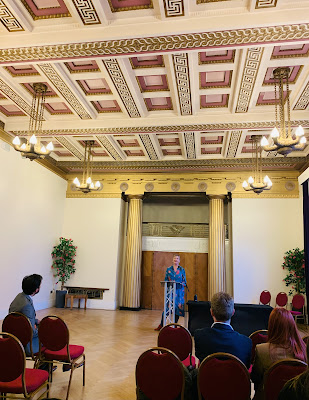by Mai Musié
In April 2022 the prestigious annual
Classical Association conference took place at Swansea University. The
conference was due to take place there in 2020, which would have been rather
fitting as the University marked its centenary that year, but we all know what
happened that year and in subsequent years. Despite the challenges of
the global pandemic, which had a significant impact on our jobs and our
well-being, the conference returned in full swing in 2022. I, like many others,
was looking forward to catching up with old friends and making new ones, in
real life! The advantage of the conference was that it offered a hybrid option;
so those who were unable to travel for various reasons, including the dangers
of the lingering virus, could also participate remotely. After all, if anything
the pandemic has taught us it is the flexibility of technology to access
lectures, attend virtual events and workshops, and to participate in panels with
colleagues from across the globe on a number of topics without leaving the
comfort of your home.
A reading by Charlotte Higgins at the Guildhall complex
For me, the location of this year’s
conference had a special significance. Swansea was my adopted home; I spent a
large portion of my life studying and working there. I undertook all my degrees
at the University, seeing the institution go through many changes, including the
Classics department which used to be called Classics, Egyptology, and Ancient
History and now has a new name – History, Heritage, and Classics. This
shows the changing landscape of our disciplines in the 21st Century
and perhaps shows the flexibility of our subject in that it can fit in and be
comfortable with the humanities brand. Two days before the conference I found
out that I was successful in an interview for a job based around public
engagement and heritage – guess where? Swansea! It was a very sweet moment to
realise that I would be returning to the department where it all began back in
1999, it felt rather Odyssean and had a lovely circular feel to my journey
after spending 10 years in Oxford.
I was delighted too that the
organisers of the conference wanted to continue the inclusive nature of these
annual conferences, which for me was the highlight of the last CA conference
that took place before the pandemic. At the 2019 FIEC/CA conference in London,
I was fortunate enough to be part of not one but two panels which were
ground-breaking in terms of their set-up: the plenary panel on the first day
was an all-women affair, which looked at inclusivity and Classics. The second
panel on the third day involved all-women from BAME background. Not to mention
the various workshops on public engagement and outreach as well as pedagogy. In
Swansea this year it was encouraging to see that the organisers wanted to
continue the tradition of making the conference as inclusive as possible – both in the diversity of the papers and panels as well as accessibility.
I was lucky enough to chair a panel on
Meroe and Nubia, which brought together Classicists and Medievalists looking at
historical, archaeological, and literary approaches to the Northeast region of
Africa. The academics presented their papers in a hybrid fashion (some were
based in the US and Poland) so there was a sense that nobody was missing out
because of travel/financial constraints. At this point I want to thank both Dr
Ian Goh and Maria Oikonomou, the Swansea CA conference organisers, for making
the time difference so bearable for our speakers! The other panel I was
involved in was the Persia panel. It was such pleasure to be giving a paper
alongside my former external examiner Prof. Lloyd Llewellyn-Jones, but the
highlight has to be the added feature of our panel which included 'Persia on
the Curriculum' led by three fantastic school teachers – Peter Wright (Head of
Classics, Blackpool Sixth Form College), James Renshaw (Classics Teacher,
Godolphin and Latymer School), and Anna McOmish (Head of History, Aldridge
School). The fruitful discussion that followed amongst participants and
attendees is possibly the reason why the annual Classical Association is so
successful – that marrying up of university and school teaching and learning, a
truly collaborative affair.

Other highlights of the conference
included the inimitable Charlotte Higgins as she read an extract from her
latest book ‘Greek Myths: A New Retelling’ in a rather fitting setting of the
neo-classical and art-deco designed building the Guildhall complex (part of the
offices of the City and County of Swansea Council). Of course, the biggest
highlight of the annual conference is the conference dinner, and for obvious
reasons this year had a special meaning to it. The setting – that
neoclassical/art deco flair of the building, the classical music – led by Dr
Ian Goh (who knew he was a professional violinist!), and of course the
announcement of the CA Prizes. As the 2019 recipient of the CA Prize, I knew how
special these prizes were and what it meant to the recipient. I was especially
delighted to witness that this year’s winner was Dr Cora Beth Fraser who has
taken Classics outreach to another level. You can find out more about Cora and
her work here – you
will have to agree that the CA couldn’t have found a more worthy winner!
I wanted to conclude with a quote from
another CA prize winner – this time from the Teaching category. L E
Jenks-Brown’s experience of the CA conference this year, where she presented
her first conference paper, really does capture the buzz and inclusive nature
of the event:
“It was a
relief to be able to find quieter areas, such as the seating near the
bookshops, and the Neurodiversity panel’s safe space near the main lecture
theatre, to which to retreat.
The hybrid
nature of the conference was also really interesting, as it enabled a lot more
speakers as well as listeners to be in attendance. I found the lectures on
physical objects and reception the most personally interesting. I loved the
chance to handle objects from the museum, and the teaching-focussed pedagogical
panels were extremely interesting and useful.
As I was
staying with my husband and toddler outside of Swansea, I missed out on some of
the social aspects of the conference, but the conference dinner with the
presentations on the Sunday night was really exciting, and the whole conference
was nice chance to catch-up with IRL (in real life) and Twitter friends.”
Dr Mai Musié is an Ancient Historian and Public Engagement Specialist, and is Public Engagement Officer for History, Heritage, and Classics at Swansea University
Email: m.musie@swansea.ac.uk ; maimusie@outlook.com
Website: drmaimusie.com
Twitter: @Dr_MaiMusie

























